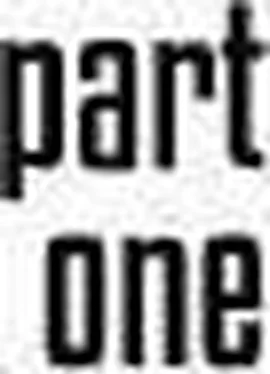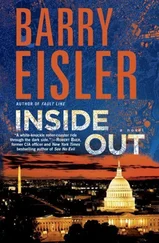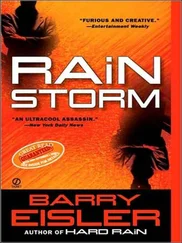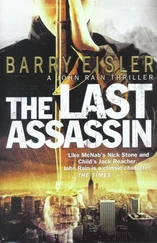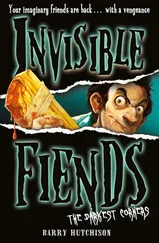Barry Eisler - The Detachment
Здесь есть возможность читать онлайн «Barry Eisler - The Detachment» весь текст электронной книги совершенно бесплатно (целиком полную версию без сокращений). В некоторых случаях можно слушать аудио, скачать через торрент в формате fb2 и присутствует краткое содержание. Жанр: Триллер, на английском языке. Описание произведения, (предисловие) а так же отзывы посетителей доступны на портале библиотеки ЛибКат.
- Название:The Detachment
- Автор:
- Жанр:
- Год:неизвестен
- ISBN:нет данных
- Рейтинг книги:3 / 5. Голосов: 1
-
Избранное:Добавить в избранное
- Отзывы:
-
Ваша оценка:
- 60
- 1
- 2
- 3
- 4
- 5
The Detachment: краткое содержание, описание и аннотация
Предлагаем к чтению аннотацию, описание, краткое содержание или предисловие (зависит от того, что написал сам автор книги «The Detachment»). Если вы не нашли необходимую информацию о книге — напишите в комментариях, мы постараемся отыскать её.
The Detachment — читать онлайн бесплатно полную книгу (весь текст) целиком
Ниже представлен текст книги, разбитый по страницам. Система сохранения места последней прочитанной страницы, позволяет с удобством читать онлайн бесплатно книгу «The Detachment», без необходимости каждый раз заново искать на чём Вы остановились. Поставьте закладку, и сможете в любой момент перейти на страницу, на которой закончили чтение.
Интервал:
Закладка:
I turned the corner into the station proper and there was the second guy, standing under the florescent lights in front of the ticket vending machines, looking at the wall map above like an extra-large, extra-confused tourist. Kasuga isn’t a main thoroughfare, and the area was mostly deserted-just a glassy-eyed ticket puncher in a booth, looking about as sentient as a potted plant, and a couple of high school kids who were testing their English trying to help my new friend find whatever it was he was looking for. I heard him grumble that he was fine as I moved past and could almost have sympathized-having a civilian address you when you’re trying to be invisible is always a bitch. I slid a prepaid pass into the ticket machine and went through to the platform.
I strolled slowly along, the grimy tracks below me and to my right, the white tiled wall gleaming to my left. I passed a few Tokyoites standing here and there-a girl with tea-colored hair and garish makeup texting on a mobile, a sarariman absently practicing his golf swing, a couple of people I recognized from the Kodokan-but no one who tickled my radar. About two thirds of the way to the end I stopped and stood with my back close to the wall. But for the hum of an air conditioning unit, the platform was silent. From somewhere inside the tunnel to my left, I could just hear dripping water.
I might have glanced back, but doing so would only confirm what I already knew: they had fallen in behind me. They’d keep well down the platform, and when a train arrived they’d get on it, two or three cars away. At each stop, they’d check through the sliding doors to see if I was getting off, and follow me when I did. When they’d tailed me to a venue they found sufficiently dark, or isolated, or otherwise suitable for the business at hand, they’d do what they came for and depart.
But that’s the problem with dark, isolated, and otherwise suitable venues. Like tracer rounds, they work in both directions.
I felt a rumble approaching from far down in the tunnel to my right, and a voice over a public address system announced the arrival of a Meguro-bound train. The rumble grew louder. I glanced to my right and glimpsed the two giants, pressed against the wall about halfway down the platform-the spot I’d most likely overlook if I glanced in the direction of an approaching train. Not too close to alarm me; not so far that they’d get picked up in the natural angle of my vision. I didn’t know who I was dealing with, but the positioning showed some experience.
It wouldn’t have been hard to lose them. I doubted they knew the city well at all and they couldn’t possibly have known it the way I do. But I didn’t see the point. A long time ago, in another context, a man I considered dangerous told me the next time he saw me, he would kill me. I took him at his word, and prevented him from carrying out his promise. It was the same now. If these guys wanted to meet me, we’d get the meeting over with tonight. I wasn’t going to spend the rest of my days looking over my shoulder, wondering when they’d show up next. And I wasn’t going to look for an opportunity to politely ask them about the nature of their interest, either. When you’ve spent a lifetime in my former line of work, and when two guys this big show up at your only possible known locale and start following you, it’s time to assume the worst, and to act accordingly.
The train hurtled out of the tunnel and began to slow, its brakes hissing, its wheels screeching against the metal tracks. It shuddered to a stop and the doors slid open. A few passengers stepped out. I walked into a mostly empty compartment and stood facing the doors, just in case. No one else got on. After a moment, a loudspeaker voice warned passengers the train was leaving, and then the doors hissed closed and the train jerked into motion.
I thought I’d take them to Jinbocho, two stops away on the Mita line and best known for its numerous antiquarian book shops. I liked the area, too, for a coffee shop not far from the station, appropriately enough called Saboru, the Japanese word for lounging, loafing, playing hooky, or otherwise taking a timeout from the world. Though I would only take the giants past the coffee shop, not inside. And the timeout I had in mind for them was going to be longer than what saboru ordinarily implied.
When the train stopped at Jinbocho station, I got unhurriedly off and headed for the A7 exit. I didn’t look behind me. I didn’t need to. They might have been sufficiently familiar with Tokyo to know how quickly you can lose the subject of surveillance in the shifting nighttime crowds, the unmarked, narrow alleys, of a section of the city as old and labyrinthine as Jinbocho. Or they might not have been even that familiar, in which case they’d lack the confidence to let anything more than a short gap open up between us. Either way, they would stay close now until their first opportunity.
When I was a kid, I had to learn to deal with bullies. First in Japan, where small half-breeds like me attracted the righteous attentions of larger children for whom cruelty and joy were indistinguishable; later, after my father died, in small town America, where I was an exotic half-Asian kid with limited English and a funny accent. During my first week at the American public school in which my newly-widowed mother had enrolled me, I’d noticed a much larger kid eyeing me, a meaty, crew-cut blond boy the other kids called the Bear. The Bear had acquired his nickname, apparently, because his favorite thing to do was to grab his victims in a frontal bear hug, squeeze them senseless, then throw them to the ground, where he could hurt and humiliate them at will. I saw one hapless kid get the treatment-the Bear sucked him in; the kid tried to push away but then his arms crumbled; the Bear threw him down and beat the crap out of him. I figured everyone he’d ever grabbed must have reacted the same way: if someone is trying to draw you in to squeeze you to death, you’d naturally resist. So it stood to reason that the Bear might not be prepared for someone who failed to resist his embrace. Who, instead, embraced him back.
It didn’t take long for my turn to come. Though I lacked the frame of reference at the time, I recognized the behaviors-the looks, the comments, the accidental-on-purpose hallway shoulder slams-that for bullies on both sides of the Pacific constituted a kind of foreplay. And I instinctively understood that the little signs were all a tactical weakness, too, because they informed the intended victim of what was coming, and when. I resolved never to display such warnings myself, and I never have.
It was on a grass berm behind the school’s weedy baseball field that the Bear decided to consummate our incipient relationship. I’d studied him enough, and was experienced enough, to recognize even before he did that this would be the place and time. So when he nudged his friends and pointed at me, it was almost comforting, like watching an actor dutifully playing his part in a drama the conclusion of which I already knew. He swaggered over to where I was standing and demanded, What are you looking at? It was so much what I’d expected, I think I might have smiled a little, because although I didn’t respond, for an instant I thought I saw doubt pass across his features like the shadow of a fast-moving cloud. But then it was gone, and he was again accusing me of looking at him, the one line of inquiry apparently having exhausted his creative capacity, and he threw out his arms and lunged at me, just as I’d hoped he would.
As his arms circled my back and he started to pull me in, I shot my hands forward and dug my fingers into the back of his neck, my elbows braced against his chest. I felt him jerk in surprise but he only knew the one move and it had always worked before, so he didn’t stop-he locked his hands and started to squeeze, but now I was squeezing, too, my biceps tightening with the effort, my forearms corded, bringing his head alongside mine, and as our left cheeks connected I dug my face in, bit into his earlobe, and ripped it free with a jerk of my head. He screamed, suddenly trying to push me away, but I was clamped onto him like pliers and I bit him again, this time on the back of the ear. Cartilage crunched and tore loose and my mouth was filled with hot, coppery blood, and a primal frenzy swept through me as I realized how I’d made him bleed. He screamed again, lost his balance, and fell onto his back with me on top of him. I spat out what I’d chewed off, reared up, and started raining punches down on his face. He covered up blindly, in a panic. Someone tried to grab me but I slipped free and darted in for another go at his ear. This time I couldn’t find it-there was too much blood, and not enough ear-but just the feeling of the renewed attack made the Bear shriek in terror and scramble from beneath me as the other kids pulled me loose.
Читать дальшеИнтервал:
Закладка:
Похожие книги на «The Detachment»
Представляем Вашему вниманию похожие книги на «The Detachment» списком для выбора. Мы отобрали схожую по названию и смыслу литературу в надежде предоставить читателям больше вариантов отыскать новые, интересные, ещё непрочитанные произведения.
Обсуждение, отзывы о книге «The Detachment» и просто собственные мнения читателей. Оставьте ваши комментарии, напишите, что Вы думаете о произведении, его смысле или главных героях. Укажите что конкретно понравилось, а что нет, и почему Вы так считаете.
